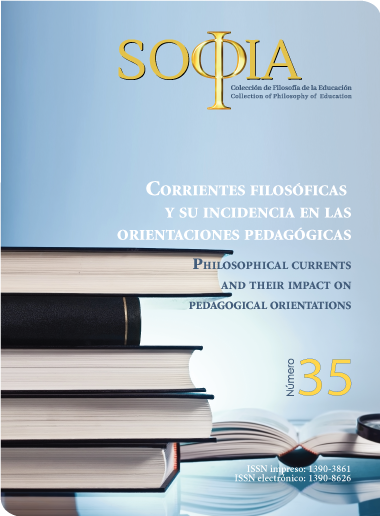On the possibility of a realist pedagogical constructivism
Main Article Content
Abstract
Article Details

This work is licensed under a Creative Commons Attribution-NonCommercial-ShareAlike 4.0 International License.
Authorship: The list of authors signing must include only those people who have contributed intellectually to the development of the work. Collaboration in the collection of data is not, by itself, a sufficient criterion of authorship. "Sophia" declines any responsibility for possible conflicts arising from the authorship of the works that are published.
Copyright: The Salesian Polytechnic University preserves the copyrights of the published articles, and favors and allows their reuse under the Creative Commons Attribution-NonCommercial-ShareAlike 3.0 Ecuador license. They may be copied, used, disseminated, transmitted and publicly displayed, provided that: i) the authorship and the original source of their publication (journal, editorial and work URL) are cited; (Ii) are not used for commercial purposes; Iii) mention the existence and specifications of this license.
References
Alcalá, Ramón Román
“Ni realismo, ni anti-realismo: el escepticismo como raíz del constructivismo filosófico”. ÉNDOXA: Series Filosóficas, n.o 38, 2016, pp. 75-95. Madrid: UNED.
Alford, Brad y Beck, Aaron
The integrative Power of Cognitive Therapy. New York: Guilford Press.
Ballantyne, Nathan
“Epistemic Trespassing”. Mind, Vol. 128. 510. April 2019. doi:10.1093/mind/fzx042.
Barrio Maestre, José María
“Las bases gnoseológicas de las modernas teorías sobre el aprendizaje. Una interpretación crítica del paradigma constructivista”. Revista de Educación, 321 (2000), pp. 351- 370.
Bellomo, Santiago
Lenguaje, libertad, verdad. El realismo expresivo de Charles Taylor. Pamplona: EUNSA.
Dreyfus, Richard y Taylor, Charles.
Recuperar el realismo. Madrid: Rialp.
Garber, Didu
“Reflexiones en torno a Sobre la certeza de Wittgenstein: fundacionalismo, conocimiento y certeza”. Revista de Filosofía, 57, 2007-3, pp. 7 – 51. ISSN 0798-1171
García, Rolando
“Prefacio”. Piaget, Jean. Introducción a la Epistemología Genética. Buenos Aires: Paidós.
El conocimiento en construcción. Barcelona: Gedisa.
Gilson, Etienne
El realismo metódico. Madrid: Rialp. Tercera edición.
La unidad de la experiencia filosófica. Madrid: Rialp.
Llano, Alejandro
El enigma de la representación. Madrid: Síntesis.
Meyer, Catherine
Los nuevos Psi. Lo que hoy sabemos sobre la mente humana. Buenos Aires: Sudamericana.
Millán Puelles, Antonio
El enigma de la representación. Comentario sobre un libro de Alejandro Llano. Revista de filosofía. 3ª. Época. Vol. XI (1999), núm. 22, pp. 282-298.
NAGEL, Thomas
Una visión desde ningún lugar, México: FCE.
Piaget, Jean
Six etudes de psychologie. Edición en castellano: 1993. Seis estudios de psicología. Buenos Aires: Editorial Planeta.
Sabiduría e ilusiones de la filosofía. Barcelona: Península. Primera edición.
Pieper, Joseph
“El elemento negativo en la filosofía de Santo Tomás de Aquino”. Creaturidad y tradición. Buenos Aires: FADES, pp. 29-39.
RORTY, Richard
Understanding and Social Inquiry, Notre Dame, Indiana: University of Notre Dame Press.
“Taylor and Dreyfus, «A Discussion»”. Review of Metaphysics, 34 (1980).
“Review: Taylor on Self-Celebration and Gratitude”. Philosophy and Phenomenological Research, 54, 1994.
“Taylor on Truth”. James Tully (ed.), Philosophy in an Age of Pluralism: The Philosophy of Charles Taylor in Question, Cambridge, Cambridge University Press, 1995 (reprinted), pp. 20-33.
Verdad y progreso. Escritos filosóficos. Barcelona: Paidós,
Taylor, Charles
a. “Theories of Meaning”. Philosophical Papers 1. Human Agency and Language, Cambridge: Cambridge University Press.
b. “The Pre-Objective World”. Review of Metahysics. 12. pp 108-132
“Rorty in the Epistemological Tradition”. Alan Malachowski (ed.), Reading Rorty. Critical Responses to Philosophy and the Mirror of Nature (and Beyond), Cambridge: Basil Blackwell, 1990 (reprinted 1991), pp. 257-275.
Argumentos filosóficos. Barcelona: Paidós.
“Thomism and the Future of Catholic Philosophy”, New Blacfriars, April (1999).
“What´s Wrong with Foundationalism?: Knowledge, Agency, and World”. Mark Wrathall and Jeff Malpas (eds.), Heidegger, Coping, and Cognitive. Essays in Honour of Hubert L. Dreyfus, Vol. 2, Cambridge: MIT Press, pp. 115-134.
“Foundationalism and the Inner-Outer Distinction”. Nicholas H. Smith, Reading Mc. Dowell. On Mind and World, London: Routledge, pp. 106-119.
a. “Closed World Structures”. Mark A. Wrathall (ed.), Religion after Metaphysics, London: Cambridge University Press, pp. 47-68.
b. “Rorty and Philosophy”. Charles Guignon and David R. Hiley (eds.), Richard Rorty, Cambridge: Cambridge University Press, pp. 158-179.
“Merleau-Ponty and the Epistemological Picture”. Taylor Carman and Mark B. N. Hansen (eds.), The Cambridge Companion to Merleau-Ponty, New York: Cambridge University Press, pp. 26-49.
Wittgenstein, Ludwig
Investigaciones filosóficas. Barcelona: Editorial Crítica.
Aforismos. Cultura y valor. Madrid: Espasa Calpe.

